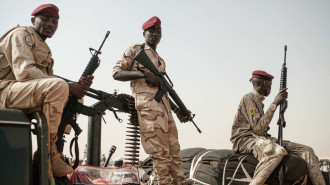South Sudan faces arms embargo 'if political agreement not reached'
The resolution passed with the minimum nine "yes" votes, with six countries abstaining: Russia, China, Bolivia, Kazakhstan, Equatorial Guinea and Ethiopia.
The resolution - which promises sanctions against six people including the country’s defence chief - asks Secretary-General Antonio Guterres to report by 30 June on whether a "viable political agreement" has been reached and whether fighting is taking place.
Should he report fighting or lack of an agreement, the Security Council will consider imposing an arms embargo or sanctions against the six officials - or both measures within five days.
The six would face a global travel ban and assets freeze if the resolution is implemented.
The proposed sanctions blacklist would target Defence Minister Kuol Manyang Juk for violating the latest ceasefire signed by the government last year and for leading attacks on the northeastern town of Pagak that was captured from rebel forces in 2017.
Also listed is cabinet minister Martin Elia Lomuro for threatening the press, obstructing humanitarian aid and impeding the work of the UN peacekeeping mission in South Sudan.
Information Minister Michael Makuei is cited for his role in planning an attack in 2014 on a United Nations compound in Bor and overseeing a campaign to suppress the media.
Former military chief Paul Malong faces possible sanctions for ordering government forces to attack civilians, schools and hospitals and deputy army chief of staff Malek Reuben for overseeing an offensive in 2015.
 |
The United States has lost its patience. The status quo is unacceptable. It is long past time for all of us to demand better for the South Sudanese people - Nikki Haley, US ambassador |
 |
The proposed sanctions list also includes Koang Rambang Chol for leading attacks in northern Bieh state and ordering his forces to impede the work of aid workers, according to the draft.
South Sudan won independence from Sudan in 2011, with critical backing from the United States, which remains Juba's biggest aid donor.
Countless efforts have failed to bring peace to a country now in its fifth year of a war where targeted ethnic killings, gang rapes and other atrocities have occurred.
The country descended into civil war in late 2013 when Kiir accused former vice president Riek Machar of plotting a coup.
In the years since, millions have been uprooted, triggering a regional refugee crisis, and millions more have been pushed to the brink of starvation, while tens of thousands have been killed.
The US has repeatedly threatened to impose an arms embargo and sanctions against those blocking efforts to end the war.
In 2016, Washington failed to win enough votes at the Security Council for the arms embargo and targeted sanctions.
US Ambassador Nikki Haley told the council in January that Washington is giving up on South Sudan's president after backing the country's independence and investing over $11 billion since 2011.
She called Kiir "an unfit partner" in the pursuit of peace and urged an arms embargo on the conflict-racked nation.
Washington condemned "in the strongest terms the ongoing fighting" in violation of the 2015 agreement and reiterate its demand for a permanent cease-fire.
"The United States has lost its patience. The status quo is unacceptable. It is long past time for all of us to demand better for the South Sudanese people," Haley said.
Meanwhile, Ethiopia is leading a regional peace effort, hosting talks between the government and rebel groups but there has been no breakthrough.
Last week, South Sudan's opposition rejected a proposed peace deal that the government had only partially agreed with, bringing peace talks to a stumbling halt.






 Follow the Middle East's top stories in English at The New Arab on Google News
Follow the Middle East's top stories in English at The New Arab on Google News
![Lebanon after strikes [Getty]](/sites/default/files/styles/image_330x185/public/2184409977.jpeg?h=a5f2f23a&itok=7wpfQMyI)
![G20 Brazil [Getty]](/sites/default/files/styles/image_330x185/public/2184389194.jpeg?h=a5f2f23a&itok=t1DchCMY)
